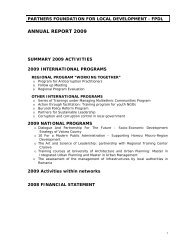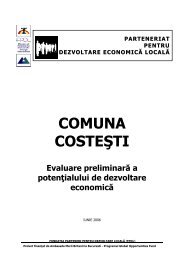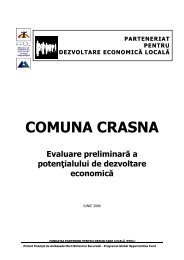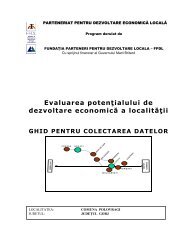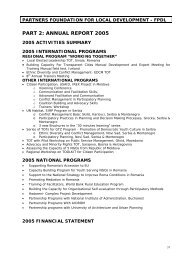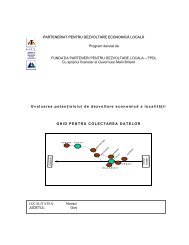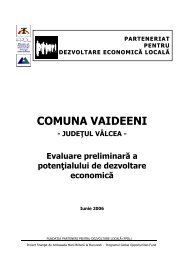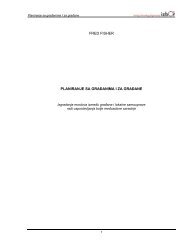Organizational Development: A Manual for Managers and ... - FPDL
Organizational Development: A Manual for Managers and ... - FPDL
Organizational Development: A Manual for Managers and ... - FPDL
Create successful ePaper yourself
Turn your PDF publications into a flip-book with our unique Google optimized e-Paper software.
A specific pro <strong>and</strong> contra management audit in the local government is closely related to the<br />
specific features of the management in local governments.<br />
We have already mentioned several reasons why we think a management audit in local<br />
governments makes sense. The basic one is that management is management, <strong>and</strong> it can be good<br />
or bad everywhere, thus it may be assessed everywhere according to a certain set of requirements<br />
related to effectiveness <strong>and</strong> efficiency, <strong>and</strong>, normally, may be improved everywhere by means of<br />
such assessment.<br />
We must also mention some arguments of those who think that there is no sense in a<br />
management audit in the local government. The basic objections are related to controllability of<br />
actions <strong>and</strong> measurability of results.<br />
When local administrations are totally dependent on current political leadership, their rights are not<br />
protected, the code of conduct is not established, <strong>and</strong> the very notion of professional carrier does<br />
not exist (substituted by the idea of ‘good relations’ or ‘being our guy’) – it is common to say “We<br />
can not control anything, we just do what we are asked to do, we do not have money to do<br />
something else, we do not have a power to decide how to do it better, ...etc. “. Politicians think that<br />
they cannot control administration because it is corrupted <strong>and</strong> unprofessional, because “they do<br />
not like to work” <strong>and</strong> “they can not work”... Officers think that they cannot control the issues<br />
because politicians are interfering all the time, <strong>and</strong> so on. However, the deeper reason is the<br />
question of responsibility. Those, who are not in position to control anything, can not be considered<br />
responsible <strong>for</strong> the results – thus those, who try to keep off the responsibility, always insist on pure<br />
controllability of issues. They are afraid of a management audit <strong>and</strong> they hate the very idea of<br />
auditing them.<br />
When the only considerable result of any work is to keep bosses (political or administrative ones)<br />
pleased – then any other result loses its importance. Those, who serve the bosses rather than<br />
provide services to the public always prefer to think <strong>and</strong> say that they work well if “there are no<br />
claims or rebooks from the heads”. They report to someone, <strong>and</strong> are not responsible <strong>for</strong><br />
something. Consequently, it has become ‘impossible’ to decide if streets are clean or dirty, if<br />
schools teach children well or not, if the water supply is good or not, if the environment is safe or<br />
not, etc. All these things have become the matter of “merely opinion”, <strong>and</strong> there is likely no one<br />
who can prove that his opinion is better than the other one.<br />
The byword has become “you can not satisfy everybody”, so, it does not matter how many there<br />
are unsatisfied people with your services; there is no point to measure it – just keep one satisfied –<br />
your boss. This result should be under the control, it should be estimated all the time. All the rest is<br />
just a trouble <strong>and</strong> unnecessary complication. Such civil servants are also afraid of a management<br />
audit <strong>and</strong> hate the idea of auditing them.<br />
Finally – if an audit is needed or not – it is a political decision, which is to be done by the top<br />
management or political leadership. They may adhere to the position that the results of local<br />
government activity are not measurable <strong>and</strong> not controllable – then nobody is really accountable,<br />
<strong>and</strong>, of course, nobody needs any management audit. Or, alternatively, they may hold the opinion,<br />
that results are measurable <strong>and</strong> controllable, they are responsible <strong>for</strong> them <strong>and</strong> need to find the<br />
best way how to manage them. Then the management audit is very much in request. And our<br />
business – just to carry it out well enough.<br />
169




